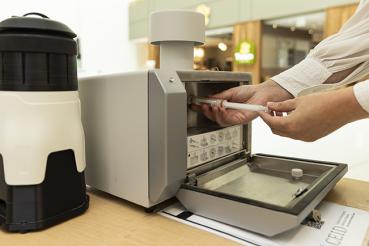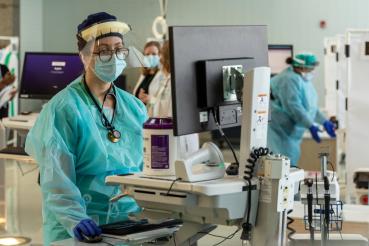“Zero COVID-19 patients in-house.”
It’s a phrase not heard since the earliest days of the pandemic. And it’s welcome news for everyone in the greater Chicago area, especially the staff of Rush University System for Health’s hospitals.
On the morning of June 28, Rush Oak Park Hospital had zero patients hospitalized with COVID-19. That same day, Rush Copley Medical Center’s COVID-19 patient census was down to one, and Rush University Medical Center had just two patients hospitalized with the disease.
“These are numbers that seemed impossible to get to not all that long ago,” said Dr. Ranga Krishnan, chief executive officer of Rush University System for Health. “It is highly symbolic of the dedication, passion and tenacity that runs throughout our system for doing everything in our power to defeat this pandemic.”
These low numbers stand in stark contrast to the hospitals’ highest census days during the pandemic.
- Rush University Medical Center had 189 patients with COVID-19 on April 24, 2020
- Rush Oak Park Hospital: 43 patients with COVID-19 on November 24, 2020
- Rush Copley Medical Center: 87 patients with COVID-19 on November 14, 2020
“While there is still community spread, incredible progress as been made,” said Dr. Omar Lateef, president and chief executive officer of Rush University Medical Center. “The amazing people in this organization worked tirelessly to prevent the spread and actively treat COVID-19 in the city, and throughout the state.”
John Diederich, president and CEO of Rush Copley Medical Centerechoed that sentiment, saying, “I am so proud of each and every one of our caregivers for going above and beyond to provide excellence in care for our patients — both COVID and non-COVID — during one of the most challenging years we’ve ever had. They have been here for our patients and for each other.”
“From the earliest days, we courageously came together with the strength of our team, knowledge and expertise to battle this virus and to do what we do best: Take care of our patients,” added Angelique Richard, PhD, RN, chief nursing officer for the Rush system and CNO and senior vice president of hospital operations for Rush University Medical Center. “We were caring for the sickest of the sick, while also deploying our team into the community to provide testing, care, vaccinations and education. The dedication and contribution to saving lives and stopping the spread of the virus was extraordinary.”
More still need vaccines to avoid being among unfortunate few
Of course, the battle against the pandemic still isn’t over. “Each day, a few hundred new cases of COVID-19 are still appearing across the state. Rush uses analytics to continuously watch the numbers and maintain a constant vigilance towards changing situations,” said Thomas Webb, associate vice president for quality analytics. “While cases are significantly lower than last summer, it is expected that we’ll continue to see sporadic hospitalizations because a certain fraction of people who get COVID-19 are going to need acute care hospitalization.”
Among the very few hospitalized across the System, the message is clear: Get your COVID-19 vaccine.
Kenneth Corbin, 70, of Plano, says he had been planning to get vaccinated when he got sick.
“I was feeling terrible,” he said, so Corbin went to Rush Copley’s Emergency Center in Yorkville, pretty sure he had COVID-19. He tested positive and was admitted to Rush Copley for what became a 25-day stay. “I’m feeling pretty good,” he says now, “but it’s a slow process.”
Corbin was discharged to a long-term care facility to finish recovering and regain his strength. “You definitely better get the shot,” he said. “I waited too long.”
While the delta variant of the COVID-19 virus is causing concerns among health experts, there is strong suggestion that vaccinated individuals are at low risk. According to one recent study described in The New York Times, the Pfizer-BioNTech vaccine was 88 percent effective at protecting against symptomatic disease caused by delta, nearly matching its 93 percent effectiveness against the alpha variant. On Tuesday, Moderna announced that its vaccine produces antibodies against the delta variant.
“This is further proof that the best thing you can do to protect yourself and your loved ones from the variants is to get vaccinated,” said John Segreti, MD, hospital epidemiologist and medical director of infection control and prevention at Rush University Medical Center. “The science is clear, and the lack of any widespread issues with the vaccine speak to its safety.”
UPDATE: As of Friday, July 2, Rush University Medical Center reached zero patients with active, transmissible COVID-19. However, there remains a small population who are no longer contagious but continue to battle the effects.
“We still have a handful of patients who continue to require the high level of care that a facility like Rush University Medical Center can provide,” added Dr. Paul Casey, RUMC chief medical officer. “However, we have not had a new COVID-19 admission in several days, which bodes well for the public health of our community. An incredible milestone when you consider how far we’ve come.”





